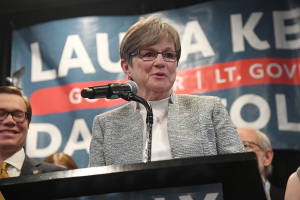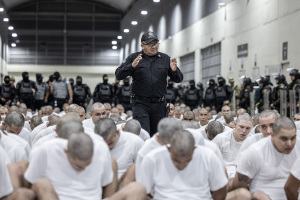Gaddafi's End in Sight; Rebels Prepare to Take Charge
Muammar al-Gaddafi, Libya’s embattled leader, finally appears willing to negotiate transition of power, Hillary Clinton said Thursday even as NATO bombings intensified and rebels geared up to establish an interim government.
“There have been numerous and continuing discussions by people close to Gaddafi and we are aware that those discussions include, among other matters, the potential for a transition,” Clinton told journalists after a meeting of Contact Group on Libya which comprised several Western and Arab nations.
This was in contrast to Gaddafi’s statement to the Libyan state television in a telephone interview Tuesday. The Associated Press reported him as saying, “We will not kneel. We will not surrender. We have only one choice – to the end! Death, victory, it does not matter, we are not surrendering.” Both Western nations and rebels have rejected government’s ceasefire proposals that do not include Gaddafi’s exit.
Clinton said there was “not any clear way forward yet,” but she also claimed that Gaddafi’s days were numbered, saying the United States was working with international partners through the U.N. to plan for the “inevitable” post-Gaddafi Libya.
Australian Foreign Minister Kevin Rudd was equally vocal about Gaddafi’s expected exit, which he said “may come sooner” than expected.
At Thursday’s meeting in Abu Dhabi – attended by representatives of NATO military alliance, the Gulf Cooperation Council, the African Union, the United Nations, the European Union, and the Arab League – the U.S. and Australia among other Western countries recognized the Benghazi-based rebels’ coalition Transitional National Council as “the legitimate interlocutor” of the Libyan people, Press TV reported.
Arab and Western nations also pledged over $1.1 billion of aid to TNC, Reuters reported. TNC is reportedly preparing to establish an interim government to take over after Gaddafi leaves and to hold elections.
Reuters quoted Rebel Oil and Finance Minister Ali Tarhouni as saying that they hoped to restart production of 100,000 barrels a day soon, without specifying a timeframe. Tarhouni also called for more aid. “Our people are dying ... So my message to our friends is that I hope they walk the walk,” he told journalists.
The planned Resumption of oil production is a significant development as the Organization of Petroleum Exporting Countries on Wednesday failed to build consensus to increase crude production ceiling which caused oil prices to rise.
As the Contact Group’s meeting, third since April, was in progress Thursday, NATO warplanes continued to bomb Tripoli, still in Gaddafi’s control.
NATO airstrikes rattled the Libyan capital Thursday targeting the outskirts of Tripoli after thousands of Gaddafi troops advanced on and shelled the rebel-held western city of Misurata, Tripoli Post reported Thursday. “There were eight explosions in a first series of strikes on Thursday. Hours later, the sound of six more attacks boomed in the distance.”
NATO, authorized by a U.N. resolution to enforce a no-fly zone over Libya to protect civilians, deployed attack helicopters over the North African country in May-end.
Tripoli Post said the rebels, “nudged by the Western powers,” were expected to start “planning for the day when Muammar Al Qathafi falls from power.”
How the transition will take place remains unclear. “That would obviously include some kind of ceasefire arrangement and some kind of political process ... and of course the question of Gaddafi and perhaps his family is also a key part of that,” Clinton told journalists.
Turkish Foreign Minister Ahmet Davutoglu was quoted as saying, “We are for the people of Libya and only for the people of Libya…But at the same time we need to find a political solution ... we need to have a roadmap to keep Libya as a united country and to complete this transitional period as a successful process.”
How Gaddafi will be dealt with following his expected fall also remains uncertain. The prosecutor of the International Criminal Court on Thursday said its investigators had found evidence linking Gaddafi to a policy of raping opponents, Reuters reported. This adds to several other charges of crime against humanity Gaddafi will likely face.
The armed conflict in Libya between anti-Gaddafi forces seeking his ouster and the Gaddafi-led government began in mid-February after the government forces used violent means to curb peaceful protests.





























